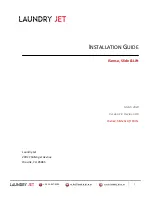
37
3. If you want to use the kneading hook (7a), first attach
the protective disc (8). This prevents the rising dough from
coming into contact with the drive shaft.
Hold the disc like a bowl. Attach the kneading hook from
below through the disc recess and secure it with a quarter
turn.
4. On the top end of the attach-
ment, you will see a recess for
the drive shaft and the cotter.
Fit the required attachment by
inserting the top end into the
drive shaft (9). Push and turn
the attachment at the same time anti-clockwise, so that the
cotter locks into place in the drive shaft.
5. Place the mixing bowl into its holder and turn the bowl in
the LOCK direction as far as it will go.
6. Now add your ingredients.
CAUTION:
Do not overfill the appliance, the max. quantity of ingredi-
ents is 2 kg or 1 litre for fluids.
7. Push the arm down until it clicks into place.
8. Plug the mains plug into a properly installed 230 V ~ 50 Hz
Schuko socket. The operating status is indicated by the blue
LED indicator lamp below the OFF button.
9. Press a speed setting (button 1-6) on the control panel (3)
to turn the appliance on. The selected setting is indicated
by a blue LED.
Table Dough Types and Tools
Dough Type
Tool
Setting
Amount
Heavy dough (e.g.
bread or shortcrust)
Kneading
hook
1-2
max. 2 kg
Medium dough (e.g.
crepes or cake batter)
Mixing
hook
3-4
max. 2 kg
Light dough (e.g.
cream, egg whites,
pudding)
Egg
beater
5-6
min. 200 ml
max. 1 l
NOTE:
• When selecting the speed setting, also refer to the
instructions in the recipe.
• Short time operation: With heavy dough do not operate
the appliance longer than 10 minutes and leave for 10
minutes to cool down.
Interrupt
operation
WARNING: Risk of injury!
• Always press the OFF button, even if you only want to
interrupt the kneading/mixing process briefly.
• Wait for the attachment to come to a complete stop!
• If you activate the lever (4) during operation to raise the
arm, a safety switch deactivates the motor. The attach-
ment will continue to rotate for a short period.
After lowering the arm, the operation can only continue if you
press a speed setting again.
End Operation and Remove Bowl
1. Press the OFF button if the dough is kneaded. Disconnect
from the mains.
2. Push the arm (4) down. The arm rises.
3. Turn the mixing bowl one short turn anticlockwise to
remove it.
4. Take the finished dough out of the mixing bowl.
5. To release the attachment from the drive shaft, push it up
and turn it a short distance clockwise. Then pull it out.
6. Clean the used parts as described under “Cleaning”.
The mincer
Preparation
Please also refer to our overviews on page 3 and 74.
1. The access to the worm housing is protected by a cover (1)
on the appliance. Turn the cover clockwise to remove it.
2. Push the silicone coupling (15) onto the worm shaft (14).
3. Set the worm, sprocket first, into the horizontal section of
the worm housing.
Assembly of the accessories is described the following sec-
tions. Prepare the mincer according to your requirements.
Assembling the mincer (see Fig. A)
NOTE:
• Depending on how fine you want to mince, select a finer
or a courser mincing plate.
• Lightly coat the mincing plate beforehand with sunflower
oil.
Proceed as described under “Preparation“.
4. Set the knife (16) onto the shaft of the worm with the sharp
side facing outwards.
5. Select a mincing plate (17). Use the recesses on the plate
to insert it into the worm housing.
More details can be found under “Attach preassembled worm
housing“.
Assembling the sausage attachment (see Fig. B)
Proceed as described under “Preparation“.
• Use prepared sausage meat, proceed as below:
4. First, set the dough divider (19) onto the shaft of the
worm. To do so, use the recesses on the dough divider.
5. Set the sausage attachment (20) onto the dough
divider. To do so, use the recesses on the sausage
attachment.
• If you want to mince pieces of meat and make sausages
in one action, first set the knife and a mincing plate as
described under “Assembling the mincer” points 4 and 5.
Then push the sausage attachment into the ring nut.
































